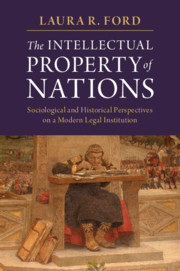 The Intellectual Property of Nations
The Intellectual Property of Nations Globalizing Intellectual Property
Published online by Cambridge University Press: 04 June 2021
This chapter focuses on the international extension of modern intellectual property, highlighting America's place in a regime of intellectual property that today is global. We trace the foundations for this global regime in international treaty frameworks, focusing on the legal parallels between treaties and contracts, as instruments of legal power. We briefly sketch the twentieth century developments of intellectual property law in the U.S., highlighting the juristic "solicitude" that is shown to intellectual property in U.S. lawmaking and international diplomacy. In the wake of World War II, the U.S. has used its position of global economic power to solidify commitments to intellectual property in a legal framework for trade relations that constitutes a super-national organization, the World Trade Organization, one that has facilitated global convergence in intellectual property law. New dangers and challenges are facing us today, in this globalized legal order, with the rise of artificial intelligence, and with patent claims extending very deeply into the social dimensions of human life, through computer-implemented inventions.
To save this book to your Kindle, first ensure [email protected] is added to your Approved Personal Document E-mail List under your Personal Document Settings on the Manage Your Content and Devices page of your Amazon account. Then enter the ‘name’ part of your Kindle email address below. Find out more about saving to your Kindle.
Note you can select to save to either the @free.kindle.com or @kindle.com variations. ‘@free.kindle.com’ emails are free but can only be saved to your device when it is connected to wi-fi. ‘@kindle.com’ emails can be delivered even when you are not connected to wi-fi, but note that service fees apply.
Find out more about the Kindle Personal Document Service.
To save content items to your account, please confirm that you agree to abide by our usage policies. If this is the first time you use this feature, you will be asked to authorise Cambridge Core to connect with your account. Find out more about saving content to Dropbox.
To save content items to your account, please confirm that you agree to abide by our usage policies. If this is the first time you use this feature, you will be asked to authorise Cambridge Core to connect with your account. Find out more about saving content to Google Drive.